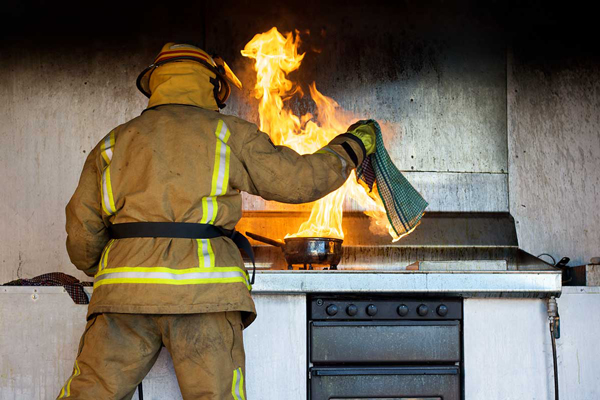Kitchen fires can be destructive and dangerous, risking lives and property. A study from the National Fire Protection Association revealed that, on average, 49% of all home fires originate from the kitchen.
In this blog post, fire damage restoration experts in Pittsburgh at Service Master of Greater Pittsburgh explain how kitchen fires originate.
With the holiday season festivities around the corner, homeowners need to be aware of possible reasons for a kitchen fire and the actions they should take once it erupts.
Common Causes of Kitchen Fires | Fire Damage Restoration in Pittsburgh
Cooking Accidents
Overheated oil in a pan or grease buildup on a stovetop can fuel flames. Even a simple act, like flipping food in a pan, can cause splattering, with hot oil or grease igniting nearby items.
Electrical Issues
The appliances and gadgets that make our kitchen tasks easier can sometimes turn against us. Faulty appliances, frayed cords, or circuits pushed beyond their limits can silently create sparks. Electrical fires often smolder before turning into raging blazes, making them particularly hazardous as they might go unnoticed until they’ve grown significantly. Regular checks of your kitchen’s electrical systems can be a lifesaver.
Flammable Materials | Fire Damage Restoration in Pittsburgh
Sometimes, everyday items in the kitchen can become unwitting accomplices in fires. Leaving flammable materials such as paper towels, dish towels, or wooden utensils near a hot stove or oven can quickly turn a seemingly harmless situation into a fiery one. Heat radiating from cooking surfaces can set these items alight quickly, causing rapid escalation.
Gas Leaks
Gas leaks are a silent yet extremely hazardous threat for homes with gas stoves. Gas lines damaged by wear and tear or poorly maintained appliances can release gas into the air, turning your kitchen into a potential time bomb. A simple spark from an electrical switch or a lit pilot light can trigger an explosive fire.
Microwave Mishaps | Fire Damage Restoration in Pittsburgh
Microwaves can sometimes lead to unexpected mishaps. Metal objects or containers not meant for microwave use can cause sparks, resulting in fires. These sparks can ignite nearby combustible materials or even damage the microwave itself. Always adhere to safe microwave practices to prevent such mishaps.
Unattended Appliances
Leaving kitchen appliances like toasters or toaster ovens plugged in and unattended can spell trouble, especially if these appliances malfunction. Faulty mechanisms can cause excessive heat or sparks, potentially igniting flammable materials nearby.
Health and Property Risks of Neglecting Fire Damage Restoration
Neglecting fire damage restoration in Pittsburgh after a kitchen fire can have serious consequences:
Residual Smoke and Soot: Even small fires can produce significant smoke and soot damage. Inhaling soot particles can harm your health, leading to respiratory issues.
Structural Damage: Fires can weaken the structural integrity of your home. Walls, ceilings, and floors may be compromised, posing safety risks.
Mold and Mildew: Water used to extinguish fires can result in moisture buildup, creating an ideal mold and mildew growth environment. These can cause health issues and further damage to your home.
Hidden Damage: Some damage may not be immediately visible, such as damage to wiring, insulation, or plumbing. Ignoring these issues can lead to more significant problems down the road.
Hire Our Experts for Fire Damage Restoration in Pittsburgh
The professionals at Service Master of Greater Pittsburgh can help manage fire damage. With over 40 years of experience managing regional disasters and emergencies, our yellow vans and teams can efficiently clean and safeguard your possessions, assisting in reducing additional costs.
Call Our Yellow Van as soon as a fire emergency strikes!

